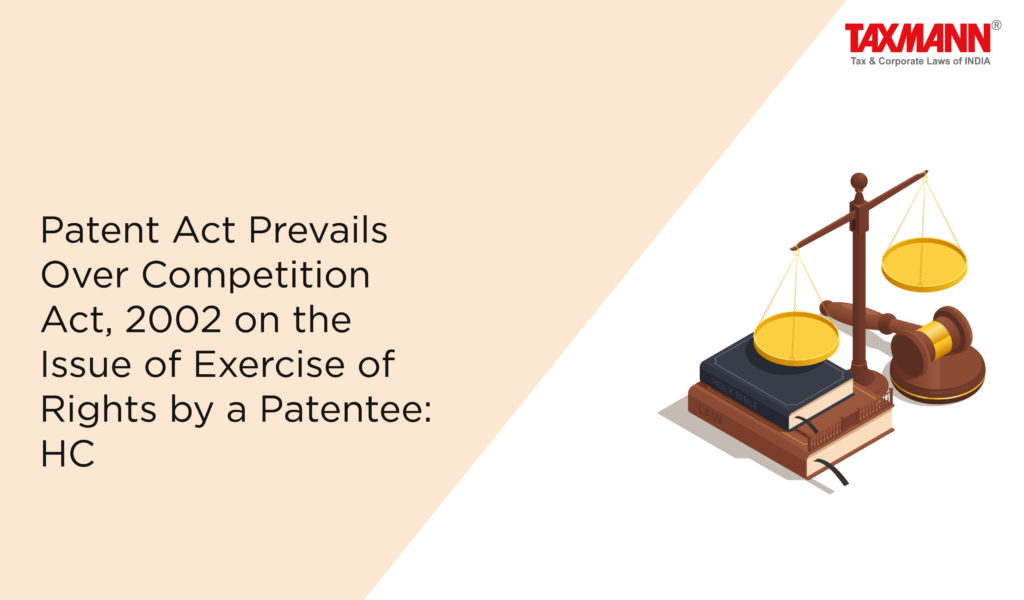Patent Act Prevails Over Competition Act, 2002 on the Issue of Exercise of Rights by a Patentee: HC
- Blog|News|Competition Law|
- 3 Min Read
- By Taxmann
- |
- Last Updated on 17 July, 2023

Case Details: Telefonaktiebolaget LM Ericsson (Publ) v. Competition Commission of India - [2023] 152 taxmann.com 317 (HC-Delhi)
Judiciary and Counsel Details
-
- Najmi Waziri & Vikas Mahajan, JJ.
- C.S. Vaidyanathan, Sr. Adv. Ms Saya Choudhary Kapur, Ashutosh Kumar, Vivek Ranjan Tiwary, Vinod Chauhan, Ms Vrinda Bagaria, Palash Maheshwari, Radhika Pareva, Munesh Sharma, Anand S. Pathak, Shashank Gautam, Ms Sreemoyee Deb, Rajat Moudgil, Ravishekhar Nair, Sahil Khanna & Vinayak Goel, Advs. for the Appellant. & Others
- Balbir Singh, ASG Avinash Sharma, Ms Monica Benjimin, Ms Anu Sura, Ms Akanksha Kapoor, Siddhant Choudhary, J. Sai Deepak & Avinash K. Sharma, Advs. for the Respondent. & Others
Facts of the Case
In the instant case, the Delhi High Court ruled that the Patents Act, 1970 shall prevail over the Competition Act, 2002 on the issue of exercise of rights by a patentee.
The High Court made the observations while dealing with a bunch of appeals moved by multinational entities i.e. LM Ericsson and Monsanto challenging the proceedings initiated against them by the CCI. An appeal was also moved by the CCI.
The appeals raised a common question i.e. when a patent is issued in India and the patentee asserts such rights, can CCI inquire into the actions of such patentee in the exercise of its powers under the Competition Act.
It was submitted on behalf of the two entities that the Patents Act is a special law dealing with patents and that issues of imposition of conditions for licensing patents are provided for under Chapter XVI, which includes anti-competitive agreements and abuse of dominant position explicitly.
On the other hand, the CCI took a stand that the Competition Act is a special law dealing with anti-competitive agreements and abuse of dominant position and thus some stray provisions in the Patents Act, which deals otherwise with patents, cannot be understood as overriding the Competition Act, which is a subsequent statute.
The Bench observed that the legislative intent is apparent in the Patents Act especially as amended by the 2003 Amendment that introduced Chapter XVI after the Competition Act was enacted. It is especially for the field pertaining to patents, unreasonable conditions in agreements of licensing, abuse of status as a patentee, inquiry in respect thereof and relief that is to be granted therefor are all to be governed by the Patents Act.
The High Court observed that once there is a clear legislative intent that the Patents Act will override the Competition Act, the same cannot be saved by the provisions of Section 21A of the Competition Act, which deals with reference by the CCI to the statutory authority.
High Court Held
The High Court held that Chapter XVI of the Patents Act is a complete code in itself on all issues pertaining to unreasonable conditions in agreements of licensing of patents, abuse of status as a patentee, inquiry and relief that is to be granted.
The High Court, further held that there is no scope of doubt beyond the pale of doubt that the Patents Act is the special statute, and not the Competition Act. It is also a fact that Chapter XVI of the Patents Act is a subsequent legislation as compared to the Competition Act.
Therefore, when assessed, by the maxim generalia specialibus non derogant or by the maxim lex posterior derogat priori, the Patents Act must prevail over the Competition Act on the issue of the exercise of rights by a patentee under the Patents Act.
Disclaimer: The content/information published on the website is only for general information of the user and shall not be construed as legal advice. While the Taxmann has exercised reasonable efforts to ensure the veracity of information/content published, Taxmann shall be under no liability in any manner whatsoever for incorrect information, if any.

Taxmann Publications has a dedicated in-house Research & Editorial Team. This team consists of a team of Chartered Accountants, Company Secretaries, and Lawyers. This team works under the guidance and supervision of editor-in-chief Mr Rakesh Bhargava.
The Research and Editorial Team is responsible for developing reliable and accurate content for the readers. The team follows the six-sigma approach to achieve the benchmark of zero error in its publications and research platforms. The team ensures that the following publication guidelines are thoroughly followed while developing the content:
- The statutory material is obtained only from the authorized and reliable sources
- All the latest developments in the judicial and legislative fields are covered
- Prepare the analytical write-ups on current, controversial, and important issues to help the readers to understand the concept and its implications
- Every content published by Taxmann is complete, accurate and lucid
- All evidence-based statements are supported with proper reference to Section, Circular No., Notification No. or citations
- The golden rules of grammar, style and consistency are thoroughly followed
- Font and size that’s easy to read and remain consistent across all imprint and digital publications are applied



 CA | CS | CMA
CA | CS | CMA
